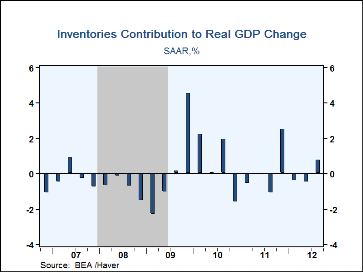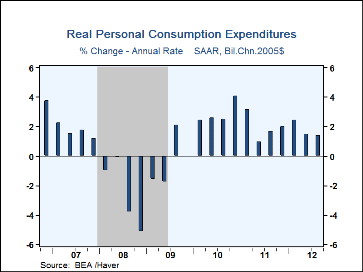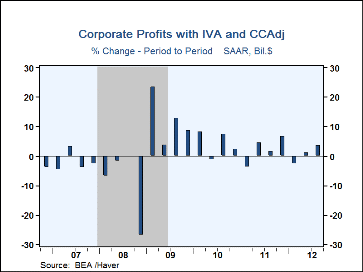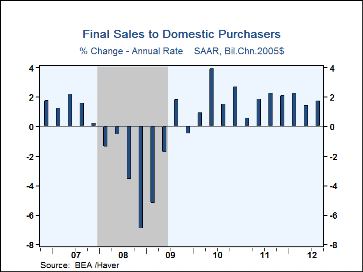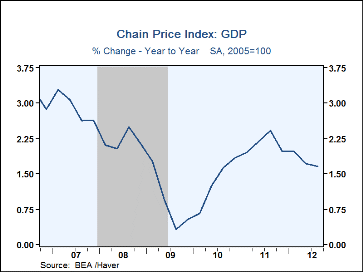 Global| Nov 29 2012
Global| Nov 29 2012U.S. GDP Growth Is Revised Upward Due To Higher Inventories
by:Tom Moeller
|in:Economy in Brief
Summary
The economy grew faster than initially reported during Q3'12. Real GDP increased at a revised 2.7% (2.5% y/y) annual rate, up from a 2.0% advance estimate and up from 1.3% during Q2. Consensus expectations were for a 2.8% rise. A [...]
The economy grew faster than initially reported during Q3'12. Real GDP increased at a revised 2.7% (2.5% y/y) annual rate, up from a 2.0% advance estimate and up from 1.3% during Q2. Consensus expectations were for a 2.8% rise. A faster rate of inventory accumulation accounted for the revision as inventories backed up with reduced growth in domestic demand.
The quicker rate of inventory accumulation added 0.8 percentage points to growth last quarter, up from the 0.1 point subtraction estimated earlier. Accumulation of nonfarm inventories sped up and added 1.2 points to growth. That pickup may have been involuntary, however, given that domestic demand growth was reduced and weak. Farm inventories alone reduced GDP growth by an unrevised 0.4 percentage points due to the drought.
Growth in domestic final demand was taken down to 1.7% (1.9% y/y) from last month's estimated 2.3% advance. Except for Q2 of this year, growth was the weakest since Q1'11. Growth amongst all the demand components was reduced. Personal consumption expenditure growth was reduced to 1.4% (1.8% y/y) from 2.0% and business spending fell at a 2.2% (+4.5% y/y) rate instead of a -1.3% rate of decline reported earlier. Growth in residential investment was revised down minimally to 14.3% (13.7% y/y) and government spending also was reduced just a tad to 3.5% (-0.6% y/y).
Improvement in the foreign trade sector contributed minimally to last quarter's GDP advance instead of subtracting 0.2 percentage points from growth. That was due to an improved 1.1% (3.0% y/y) gain in exports instead of a 1.6% decline. This nevertheless was the weakest growth since Q2'09. The uptick in imports was little revised at 0.1% (2.7% y/y).
Corporate profits growth, reported for the first time, picked up to 3.5% (8.7% y/y). After tax profits rose 5.2% (18.6% y/y). Last quarter's gain owed to an 18.3% (30.4% y/y) jump in financial sector earnings. Foreign sector profits fell 0.6% (-3.1% y/y) and domestic nonfinancial earnings slipped 0.1% (+6.4% y/y).
The GDP chain price index rose at an elevated and minimally revised 2.7% (1.7% y/y) rate, bolstered by a 6.5% (-1.3% y/y) decline in the import price index. The gain in the domestic final sales price index remained moderate at a 1.5% (1.4% y/y) rate.
The latest GDP figures can be found in Haver's USECON and USNA databases; USNA contains basically all of the Bureau of Economic Analysis' detail on the national accounts, including the new integrated economics accounts and the recently added GDP data for U.S. Territories. The Consensus estimates can be found in AS1REPNA.
| Chained 2005 $,% AR | Q3'12 (Revised) | Q3'12 (Advance) | Q2'12 | Q1'12 | Q3'12 Y/Y |
2011 | 2010 | 2009 |
|---|---|---|---|---|---|---|---|---|
| Gross Domestic Product | 2.7 | 2.0 | 1.3 | 2.0 | 2.5 | 1.8 | 2.4 | -3.1 |
| Inventory Effect | 0.8 | -0.1 | -0.5 | -0.4 | 0.6 | -0.2 | 1.5 | -0.8 |
| Final Sales | 1.9 | 2.1 | 1.7 | 2.4 | 1.9 | 2.0 | 0.9 | -2.3 |
| Foreign Trade Effect | 0.1 | -0.2 | 0.2 | 0.2 | 0.0 | 0.2 | -0.4 | 1.0 |
| Domestic Final Sales | 1.7 | 2.3 | 1.4 | 2.2 | 1.9 | 1.8 | 1.3 | -3.3 |
| Demand Components | ||||||||
| Personal Consumption | 1.4 | 2.0 | 1.5 | 2.4 | 1.8 | 2.5 | 1.8 | -1.9 |
| Business Fixed Investment | -2.2 | -1.3 | 3.6 | 7.5 | 4.5 | 8.6 | 0.7 | -18.1 |
| Residential Investment | 14.3 | 14.4 | 8.4 | 20.6 | 13.7 | -1.4 | -3.1 | -22.4 |
| Government Spending | 3.5 | 3.7 | -0.7 | -3.0 | -0.6 | -3.1 | 0.6 | 3.7 |
| Chain-Type Price Index | ||||||||
| GDP | 2.7 | 2.8 | 1.6 | 2.0 | 1.7 | 2.1 | 1.3 | 0.9 |
| Final Sales of Domestic Product | 2.8 | 2.9 | 1.5 | 2.0 | 1.7 | 2.1 | 1.3 | 0.9 |
| Final Sales to Domestic Purchasers | 1.5 | 1.6 | 0.7 | 2.5 | 1.4 | 2.5 | 1.6 | -0.2 |
Tom Moeller
AuthorMore in Author Profile »Prior to joining Haver Analytics in 2000, Mr. Moeller worked as the Economist at Chancellor Capital Management from 1985 to 1999. There, he developed comprehensive economic forecasts and interpreted economic data for equity and fixed income portfolio managers. Also at Chancellor, Mr. Moeller worked as an equity analyst and was responsible for researching and rating companies in the economically sensitive automobile and housing industries for investment in Chancellor’s equity portfolio. Prior to joining Chancellor, Mr. Moeller was an Economist at Citibank from 1979 to 1984. He also analyzed pricing behavior in the metals industry for the Council on Wage and Price Stability in Washington, D.C. In 1999, Mr. Moeller received the award for most accurate forecast from the Forecasters' Club of New York. From 1990 to 1992 he was President of the New York Association for Business Economists. Mr. Moeller earned an M.B.A. in Finance from Fordham University, where he graduated in 1987. He holds a Bachelor of Arts in Economics from George Washington University.
More Economy in Brief
 Global| Feb 05 2026
Global| Feb 05 2026Charts of the Week: Balanced Policy, Resilient Data and AI Narratives
by:Andrew Cates



